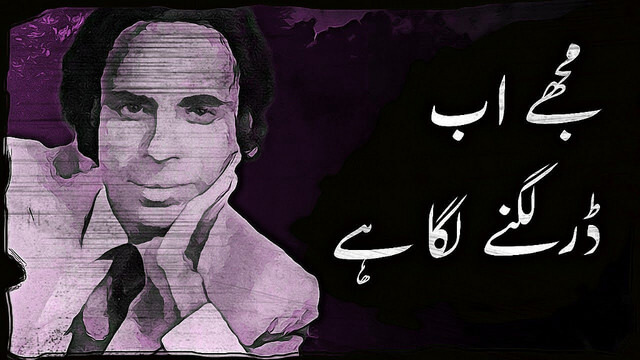Jaun Elia was born on December 14, 1931 in Amroha, Uttar Pradesh. You were the youngest of your brothers. Your father Allama Shafiq Hassan Aliya used to work a lot in the field of art and literature, and he was also a poet and astrologer.
If you want to know a quick answer of these questions, like who is Jaun Elia? About Jaun Elia, Biography of Jaun Elia, history of Jaun Elia, So please read our quick and short description about Jaun Elia in below:
Short Biography of Jaun Elia!

| Country | Pakistan |
| Full Name of Jaun Elia | Jaun Elia |
| Nick Name of Jaun Elia | Jaun Elia |
| Born of Jaun Elia | 14 December 1931 |
| Death of Jaun Elia | 8 November 2002 |
| Born Place of Jaun Elia | Amroha, Uttar Pradesh, India |
| Death Place of Jaun Elia | Karachi, Sindh, Pakistan |
| Father of Jaun Elia | Shafiq Hasan Elia |
| Mother of Jaun Elia | – |
| Brothers of Jaun Elia | Rais Amrohvi |
| Sisters of Jaun Elia | Syed Muhammad Taqi |
| Married | Yes |
| Wife of Jaun Elia | Zahida Hina |
| Son of Jaun Elia | 1(Zeryoun Elia) |
| Daughter of Jaun Elia | 2 (Fainaana Farnaam,Sohaina Elia) |
Full Biography of Jaun Elia:
Introduction:
Thousands of flowers in the Gulshan of Urdu poetry have created an ardent fragrance of realization, which has been adorning the hearts of the generation of people. This Khasabu of Ashra is present in the present lobbing that there is hardly any day that when we resort to some Urdu sehr in colloquial language, do not take it in to make your point. The name of one of the flowers of this Gulshan is Jaun Elia. And now see this sher…
“सालहा साल और एक लम्हा
कोई भी तो ना इनमे बल आया
खुद ही एक दर पर मैंने दस्तक दी
खुद ही लड़का सा मैं निकल आया”
Jaun Elia was the brother of famous journalist Rais Amrohi and world famous journalist, philosopher Syed Muhammad Taki and husband of Zahida Hina, who wrote the famous column. You used to know many languages including Inem Urdu, Hindi, English, Sanskrit, Hebrew, and Persian. This is one of the most read and heard shires in the shires of now. After partition of India-Pakistan, he went to Pakistan but he never forgot his native place India.
Early Life and Education:
Jaun Elia was born on December 14, 1931 in Amroha, Uttar Pradesh. You were the youngest of your brothers. Your father Allama Shafiq Hassan Aliya used to work a lot in the field of art and literature, and he was also a poet and astrologer.
Jaun Elia was the youngest brother of famous film director Kamal Amrohi. The other brothers were well-known scholars and journalists. Jaun Elia himself had been the editor of the famed newspaper Junk of Pakistan. Jaun Elia was Shia but his education was in the Deoband of the Sunnis. Jaun Elia translated several books of Arabic into his life in Urdu. But most of his work was not published in his life.
Apart from being sensitive to the birth of Jaun Elia Sahab, Jaun EliaSaab had said the first sehr at the age of eight, due to being a cultured and civilized environment in the house. The teenage state came as often happens in Bali’s age, they started dreaming of a well-known girlfriend Sophia and lived in the same. In the same period, his hatred against the British ruler of the country also started to emerge and the communist ideology started to affect him a lot. According to his close relative Saeed Mumtaz, there was a great interest in the language of Jaun Elia. In his childhood, where he received knowledge of Arabic Persian, he started speaking fluent English during further studies and even learned Hebrew and Sanskrit.
After India-Pakistan partition Jaun Elia:
In 1947, Jaun’s heart was broken even after the country’s fragmentation. Because he was a communist ideologue, he was strongly opposed to the division of religion and wanted to remain in India all the time. In the end, most families settled in Karachi in 1956 as a result of their departure to Pakistan. Until his last time, he remembered his birth city Amroha with great affection. Due to his heartfelt expression in Shayari and Musashire, Jaun Elia became very popular and famous in Pakistan.
According to the serious knowledge of the genre, while staying on the land of traditional Urdu poetry, Jaun Elia was always looking for an ideal in life. Where is the ideal in real life? He was angry on the people’s scandal and texture, which has led him to establish new values in his poetry. Their poetry is not poetry of the classic Ashik-Shukri, and the poetry written on the rough land of the woman-man’s love / hatred on the earth without being shayari. Jaun Elia’s absence is also of today’s man who is directly at the receiving end of making the messenger a messenger.
Ultimately, this is the reason for their breakdown. Due to the distressed situation and the sense of humor, Jaun Elia Saab became an open anarchist – had become nihilist, who had always fought with his environment. Apart from Shayari in his good times, he has also translated other literary works with a very researched work on Ismailia Sect.
Jaun Elia used to write a lot, but due to his stuttering, uncompromising style and the habit of not compromising the condition, his first book ‘Probably’ Manjar-e-Mama came in 1991. In its publication, Jaun Elia Saab himself wrote a lot and in the selection of compositions, more than ten collections of compilation and five years of editing. See what Jaun Elia Saab himself had about his own Kalam, see -.
“As much as I am in my poetry, so much so that I will not even have a bad enemy. Sometimes I have my poetry……. Bad, bizarre …… seems to be … So, no one has ever done any of my work till now.. And until God insists on doing Shayya, Shaye will not be there….”
“अपनी शायरी का जितना मुन्किर मैं हूँ, उतना मुन्किर मेरा कोई बदतरीन दुश्मन भी ना होगा। कभी कभी तो मुझे अपनी शायरी ……. बुरी, बेतुकी …… लगती है… इसलिए अब तक मेरा कोई मज्मूआ शाये नहीं हुआ.. और जब तक खुदा ही शाये नहीं कराएगा उस वक्त तक शाये होगा भी नहीं…”
Jaun Elia Saab finalized the book’s draft with a lot of understanding of close friends. By that time the dead body had become a zombie dead. This unique shayar, scholar and Manishi had already been injured by the Taluk condition, and the extreme degree of alcoholism had made them as a semi-displaced by working on the leprosy. By turning close to going to Musashrars and musicals, this shayar was confined to itself. If a person arrives in a mahfil, he is drunk while talking about himself as a mentor himself. His book ‘Probably’ took hands, people read and appreciated. Nine versions of the book soon came out with this; the popularity of Jaun Elia Saab can be estimated.
Married life of Jaun Elia:
Jaun Elia Saab’s ex-wife, Zahidah Hina, is a well-known journalist of Indo-Pak and is writing active writing on various social and social events today. His articles, especially – read the diary of Pakistan, also in India, by the readers. Jaun Elia Saab met Hina during the publication of Urdu literary magazine ‘Insha’, which later became a marriage.
From this marriage, Jaun Elia Saab received two daughters and a son, but later, due to unpleasant circumstances, the marriage was disrupted between the two of them in 1984. After the divorce, from where all the dangerous Jaun Elia was living in depression this devadas of Urdu poetry started exploring new excuses to make a lot of hurdles and to ruin themselves.
Death of Jaun Elia:
Between Elia and Zahida, divorced in the 80’s, Jaun Elia broke a lot and supported the alcohol. Jaun Elia was always annoyed with luck, perhaps that’s why this Mumtaz Shair, scholar and highly sensitive person said goodbye to this unkind world after 8 November 2002, after a long illness in a friend’s house, away from all his friends.
Composition Written By Jaun Elia:
The next compilation of Jaun Elia Saab’s poems ‘i.e.’ was published posthumously in 2003. Thereafter, his close friends Khalid Ansari published his poems Guman (2004), but the books (2006) and Goya (2008) were published in the form of books and these books have found popularity in literary circles. Jaun Elia Saab has written many elements of poetry, Ghazals, Nazm, and Kate etc.
The famous poet Kumar Vishwas compiled Jaun Elia’s poem in this book. Kumar Biswas Jaun Elia is called Khudrang. Meaning, a person who is of his own color and such a color that no one else has. Kumar Vishwas writes for him, ‘I consider Jaun Elia to be Shayari’s Che Guevara who gives a statement that I am the one who is as I am. Accept me like this they know that I am Jaun Elia and what are the views of Jaun Elia As much as the more they rejoice attitude, are having as well as their loved ones. ” As see this sehr:
“शर्म, दहशत, झिझक, परेशानी
नाज़ से काम क्यों नहीं लेती
आप, वो, जी, मगर यह सब क्या है
तुम मेरा नाम क्यों नहीं लेती |”
Jaun Elia best few creations:
नज्म:
तुम जब आओगी तो खोया हुआ पाओगी मुझे
मेरी तनहाई में ख़्वाबों के सिवा कुछ भी नहीं
मेरे कमरे को सजाने की तमन्ना है तुम्हें
मेरे कमरे में किताबों के सिवा कुछ भी नहीं
इन किताबों ने बडा ज़ुल्म किया है मुझ पर
इन-में एक रम्ज़ है जिस रम्ज़ का मारा हुआ ज़हन
मुज़दा-ए-इशरत अंजाम नहीं पा सकता
ज़िंदगी में कभी आराम नहीं पा सकता |
बेदिली क्या यूँ ही दिल गुज़र:
बेदिली! क्या यूँ ही दिन गुजर जायेंगे
सिर्फ़ ज़िन्दा रहे हम तो मर जायेंगे
ये खराब आतियाने, खिरद बाख्ता
सुबह होते ही सब काम पर जायेंगे
कितने दिलकश हो तुम कितना दिलजूँ हूँ मैं
क्या सितम है कि हम लोग मर जाएंगे
उसके पहलू से लग के चलते हैं
उसके पहलू से लग के चलते हैं
हम कहीं टालने से टलते हैं
मै उसी तरह तो बहलता हूँ
और सब जिस तरह बहलतें हैं
वो है जान अब हर एक महफ़िल की
हम भी अब घर से कम निकलते हैं
क्या तकल्लुफ्फ़ करें ये कहने में
जो भी खुश है हम उससे जलते हैं |
Poetry collections:
- Ya’ani (2003)
- Gumaan (2004)
- Lekin (2006)
- Goyaa (2008)
- shaa’yad
- Ramooz
